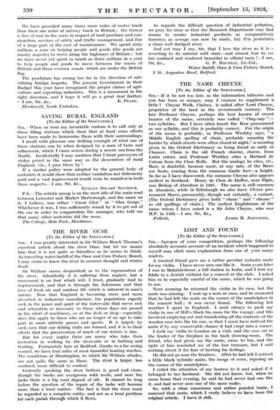THE RIVER OUSE [To the Editor of the SPECTATOR.]
SIR,— I was greatly interested in Sir William Beach Thomas's excellent article about the river Ouse. but let me assure him that it is not quite so friendless as he seems to think. As travelling water bailiff of the Ouse and Cam Fishery Board, I may claim to know the river in summer drought and winter flood.
Sir William seems despondent as to the regeneration of the river. Admittedly it is suffering from neglect, but a movement is on foot which will, I trust, gradually lead to improvement, and that is through the fisherman and that love of fresh air and outdoor life which is inherent in man's nature. Now that England is becoming more and more absorbed in industrial manufacture, the population eagerly seek in the peace and quiet of the water-side that nerve rest and relaxation so necessary to those whose days are passed in the whirl of machinery, or at the desk or shop—especially does this apply to those who are no longer of an age to take part in more athletic games and sports. It is largely by such men that our fishing clubs are formed, and it is to their efforts that the preservation of much of our waters is due.
But for every angler there are many who take their recreation in walking by the river-side or in bathing and boating. Fortunately here at Bedford, thanks to a far seeing council, we have four miles of most beautiful boating reaches. The conditions at Huntingdon, to which Sir William alludes, are not quite the same as these. The river is larger, less confined, more difficult to control.
Generally speaking the river bottom is good and clean, though the banks are overgrown with reeds, and near the locks there is a big mud deposit of silt. It cannot be long before the question of the repair of the locks- will become more than a local matter. The fact is that the river must be regarded as a complete entity, and not as a local problem for each parish through which it flows:
As regards the difficult question of industrial pollution, we pray for time so that the Research Department may find means to render industrial products as comparatively harmless as sewage can now be made, but this postulates a clean well dredged river.
And yet may I say, Sir, that' I love the river as it is— reverting to its natural wild state—and almost fear to see her confined and rendered beautiful to official taste !—I am,
Sir, &c., G. P. ROUPELL, Lt.-Col.,






































 Previous page
Previous page